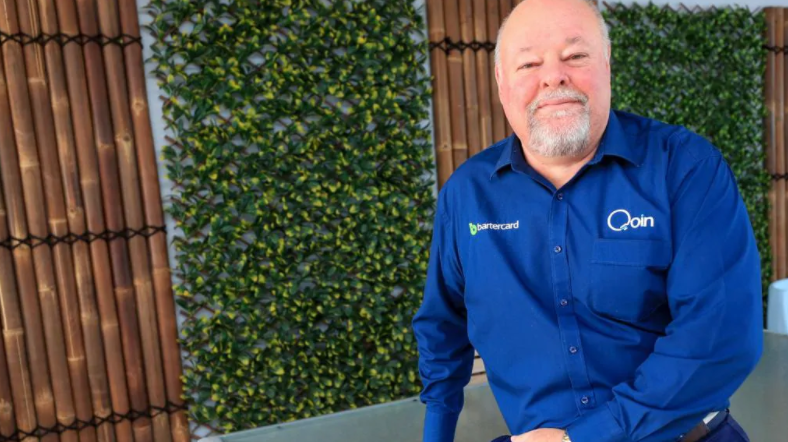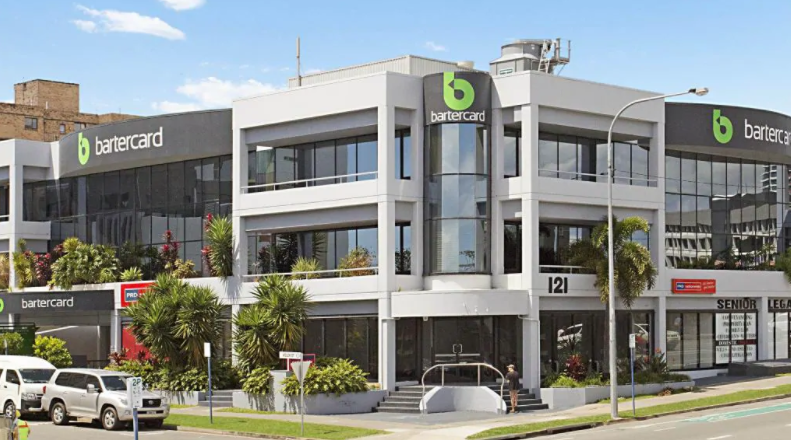GOLD Coast-founded trade exchange business Bartercard has taken until its 30th year to launch a product for consumers.
Bartercard was founded in 1991 by Wayne Sharpe, Andrew Federowsky and Brian Hall.
It grew to become the world’s largest trade exchange with offices in seven countries and thousands of merchants, who used Bartercard dollars to trade, across Australia.
In 2007 the local management team, comprised of Trevor Dietz, Mr Hall and South African expatriate Tony Wiese, bought the Australian arm for $25.5 million and went on to buy the international arm.
The three retained a 52 per cent stake in the business when it launched on the ASX as BPS Technology and valued at $58.5 million.

Bartercard owner Tony Wiese has launched a cryptocurrency called Qoin. Pic Tim Marsden
In 2016, the listed entity took a huge step when it bought Entertainment Publications, a restaurant and activity guide that provided discounts from restaurants, hotels and attractions in Australia and New Zealand and was distributed by tens of thousands of not-for-profit organisations. That brought the attention of hedge funds led by Moelis eager to tap into the $65 million in revenue the business brought in to BPS coffers in FY17.
A boardroom brawl ensued, which led to the resignation of Mr Dietz as CEO and Mr Wiese and Mr Hall from the board.
The company (which changed its name to IncentiaPay) posted a loss of $62 million in FY18 and saw its share price collapse to as low as 1.5c (from 84¢ before the stoush).

Bartercard House in Scarborough St, Southport.
“It started because they (the hedge funds) wanted to buy half our shares,” Mr Wiese said. “They first courted us with an offer to buy half our shares at 75c each. We could have made a few million dollars each.”
He said the funds wanted to pick the chairman and CEO, drive the share price up above $2, and cut staff to double the profit.
But after advice from their lawyers, the BPS Technology board decided to back out of the deal.
Mr Wiese said the funds then went “hostile” and threatened them during the meeting.
What followed was a battle for control that Mr Wiese and his fellow directors lost, resigning in February 2018 after an unsuccessful board spill.
But Mr Wiese said the funds lost out in the long run – pointing towards the shattered share price and a revolving door of management at IncentiaPay.
“They took two tigers by the tail,” he said.
“One was Bartercard and the other was Entertainment Publications.
“They are both very hard businesses. Entertainment has its own nuances and is extremely seasonal. They sell all their books between April and August so eight months of the year is no cashflow.”
Mr Wiese said he jumped at the chance to buy Bartercard back when the offer came. He said after a year of stabilising the company, following savage cuts to management by the funds, Bartercard was ready to start growing again.
It has established crypto currency Qoin (the Q stands for Queensland) as a way of merging the private Bartercard trade exchange model with a public network through blockchain technology.
Non-Bartercard members who are Qoin users will now be able to trade with Bartercard merchants – something that was not possible before. The Bartercard dollars will also be able to be spent with Qoin merchants.
“The invention of blockchain has made it possible for the consumer to also participate in the merchant ecosystem we created,” he said.
“Now any consumer … can acquire Qoin and take part in the system.
“If, for example, you want to sell your caravan or gym equipment you can sell those on the Qoin marketplace and earn Qoin which you can spend in the system or hold on to as a growing asset.”
Qoin is owned by the Qoin Association, which is an initiative of Bartercard entity Blockchain Investments Pty Ltd and registered NFP One Light Charity Foundation.
Mr Wiese said Qoin brings a lot of trading opportunities for Bartercard members.
Bartercard plans to raise revenue by providing services to Qoin users.
Published by:
Alister Thomson
Gold Coast Bulletin
March 2, 2020